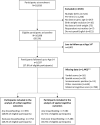To what extent does confounding explain the association between breastfeeding duration and cognitive development up to age 14? Findings from the UK Millennium Cohort Study
- PMID: 35613097
- PMCID: PMC9132301
- DOI: 10.1371/journal.pone.0267326
To what extent does confounding explain the association between breastfeeding duration and cognitive development up to age 14? Findings from the UK Millennium Cohort Study
Abstract
Background: Breastfeeding duration is associated with improved cognitive development in children, but it is unclear whether this is a causal relationship or due to confounding. This study evaluates whether the observed association is explained by socioeconomic position (SEP) and maternal cognitive ability.
Methods: Data from 7,855 singletons born in 2000-2002 and followed up to age 14 years within the UK Millennium Cohort Study were analysed. Mothers reported breastfeeding duration, and children's cognitive abilities were assessed at 5, 7, 11, and 14 years using validated measures. Standardised verbal (age 5 to 14) and spatial (age 5 to 11) cognitive scores were compared across breastfeeding duration groups using multivariable linear mixed-effects models (repeated outcome measures).
Results: At all ages, longer breastfeeding durations were associated with higher cognitive scores after accounting for the child's own characteristics. Adjustment for SEP approximately halved the effect sizes. Further adjustment for maternal cognitive scores removed the remaining associations at age 5, but not at ages 7, 11 and 14 (e.g.: verbal scores, age 14; breastfed ≥12 months vs never breastfed: 0.26 SD; 95%CI: 0.18, 0.34).
Conclusion: The associations between breastfeeding duration and cognitive scores persist after adjusting for SEP and maternal cognitive ability, however the effect was modest.
Conflict of interest statement
The authors have declared that no competing interests exist.
Figures







